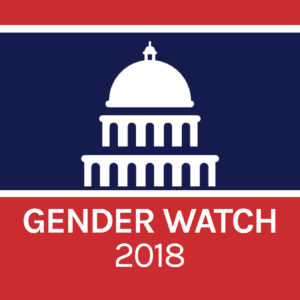A New Era for Women in Politics
 From March to December 2018, the Barbara Lee Family Foundation (BLFF) and the Center for American Women and Politics (CAWP) partnered to offer Gender Watch 2018, which tracked, analyzed, and illuminated gender dynamics in the 2018 midterm elections. With the help of expert scholars and practitioners, Gender Watch 2018 furthered public understanding of how gender influences candidate strategy, voter engagement and expectations, media coverage, and electoral outcomes in campaigns. The blog below was written for Gender Watch 2018, as part of our collective effort to raise questions, suggest answers, and complicate popular discussions about gender’s role U.S. elections.
From March to December 2018, the Barbara Lee Family Foundation (BLFF) and the Center for American Women and Politics (CAWP) partnered to offer Gender Watch 2018, which tracked, analyzed, and illuminated gender dynamics in the 2018 midterm elections. With the help of expert scholars and practitioners, Gender Watch 2018 furthered public understanding of how gender influences candidate strategy, voter engagement and expectations, media coverage, and electoral outcomes in campaigns. The blog below was written for Gender Watch 2018, as part of our collective effort to raise questions, suggest answers, and complicate popular discussions about gender’s role U.S. elections.
On November 15, The Washington Post brought together newly-elected lawmakers, political strategists and experts to evaluate the midterm election results for female candidates. The Barbara Lee Family Foundation was the presenting sponsor of the event, with the Center for American Women and Politics serving as the education sponsor. BLFF’s founder and president Barbara Lee shared the opening remarks below to frame the discussion. You can find the selected clips from the event at this link and the full video embedded below.
I’m a woman on a mission. More than 20 years ago, I dedicated my life to increasing women’s representation in public office. I was wonderfully naïve about it. When I told friends and colleagues that I was on a mission to elect a woman president, they would smile politely and say, “Oh that’s nice, Barbara.” More recently they’ve admitted to me what they were really thinking: “This lady is out of her mind.”
I believed then, and I still do, that electing women is the single most powerful way to transform our society, create better public policy, and provide a new generation of role models for women and girls.
Since I began this work, I’ve seen my share of highs and lows; tough losses and inspiring breakthroughs. In two decades, I’ve never seen a year like 2018. Like many of you, my colleagues and I at the Barbara Lee Family Foundation were closely watching and cheering the campaigns of the record number of women who ran for local, state, and national office this year. And it’s no surprise that much of the post-election media attention, including here at the Washington Post, has been focused on the extraordinary women who won. And that’s how it should be. I love reading it! And I can’t wait to see what the newly-elected women accomplish.
At the same time, we cannot forget the women whose next steps are less certain. Those, who after risking it all, after sacrificing hours of sleep and time with family, must now, figure out their next moves. The reality is that the majority of courageous women who stepped up to run in 2018 will not be sworn into office come January. That’s to be expected. Few people realize that on election day 1992—famously dubbed the Year of the Woman—
more than three times as many women lost their bids for Congress as won them.
We know that women who lose elections have historically faced a harder road back to politics than their male counterparts. Men who lose scarcely miss a step. They are quickly buoyed by the old boys’ club, a powerful network of mentors and advisors. In fact, almost every U.S. President in the last 50 years has had at least one political loss on his record. Women almost never have access to those same networks or resources. Time and again, we’ve seen women blamed and shamed for their defeats—or told to step aside and make room for someone with broader appeal. More often than not, that “someone” is a man.
Last week, the Barbara Lee Family Foundation released new research in response to the record number of women candidates in 2018. Our nonpartisan research demonstrates that, in today’s climate, it’s possible for women who lose to make a successful return to politics. Voters say they will not penalize women candidates for having lost an election in the past. Still, our research shows that how a candidate handles the loss, and what she does with her time in between campaigns, can affect her future prospects.
Among the big takeaways:
- Voters respond best to forward-looking messages, meaning that a candidate can set the stage for relaunching her campaign as early as her concession speech.
- Voters also want to see that a candidate is committed to continuing her work and staying engaged in public life, whether by serving in another political office, conducting a listening tour, or helping other women run.
Women have always been on the front lines in communities: organizing rallies, registering voters, making calls, and knocking on doors. Now is not the time to slow down. Now is the time to double down—to rally around the candidates who broke barriers this year and those who fell short.
Many women broke barriers simply by winning their primaries. And to the reporters in the room, you have an important role to play as well. The famous Congresswoman Bella Abzug of New York, said it best. After losing a special election, she told a Washington Post reporter, “I object to people writing my political obituary.” I ask you to keep her words in mind as you write the history of these midterms. Don’t make these stories obituaries. Instead, when you interview a woman who lost, try asking her, “What’s next?”
With everyone’s support, we will transform this year’s gains into lasting progress, with equal representation for women and better public policy for all.
Thank you all so very much for being with us for this important conversation.






